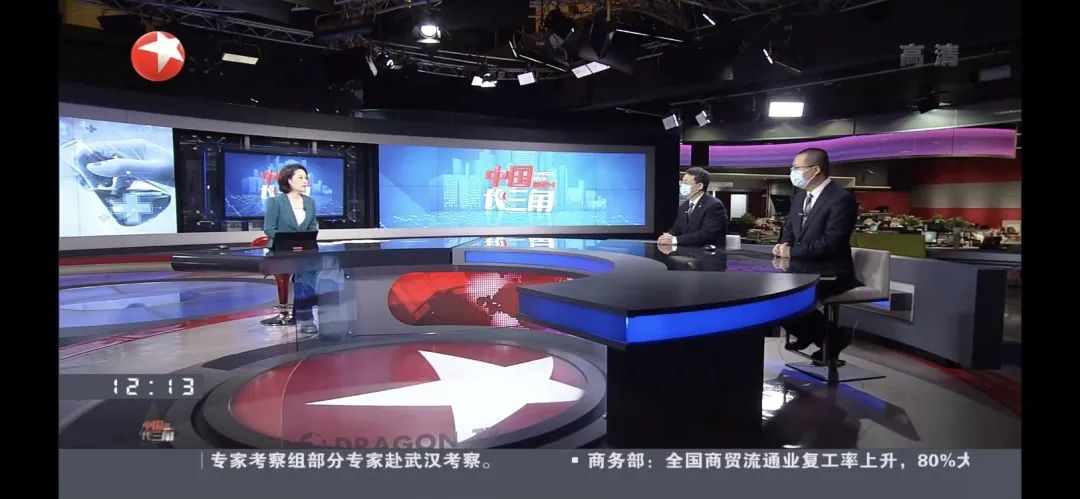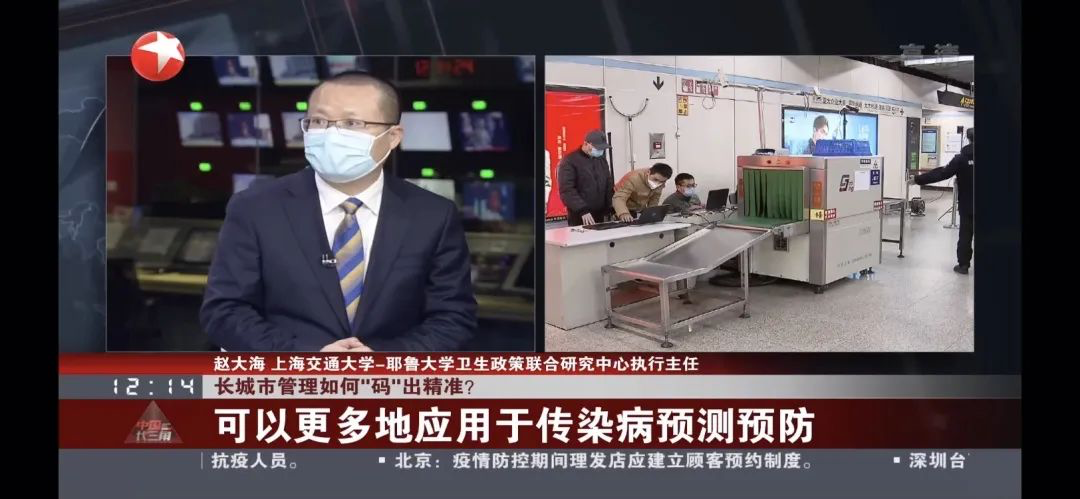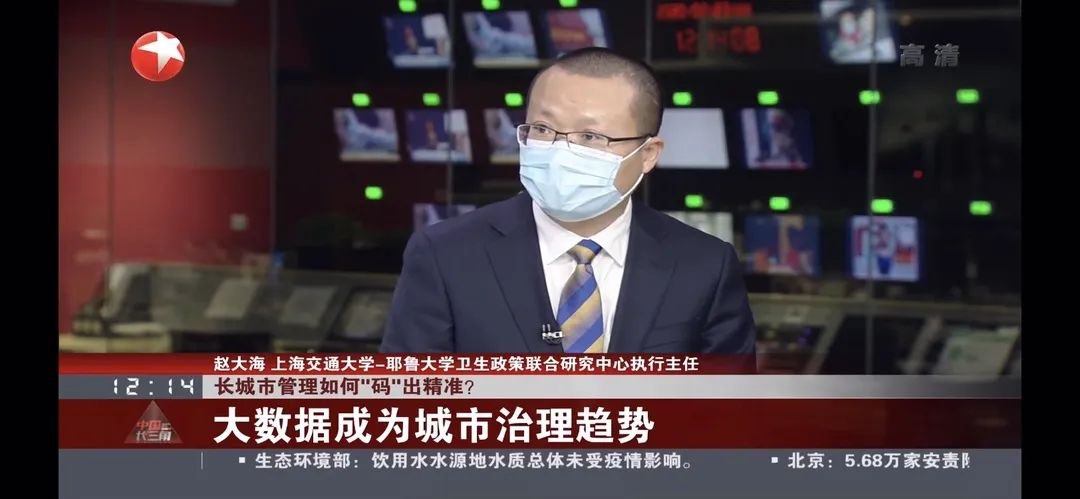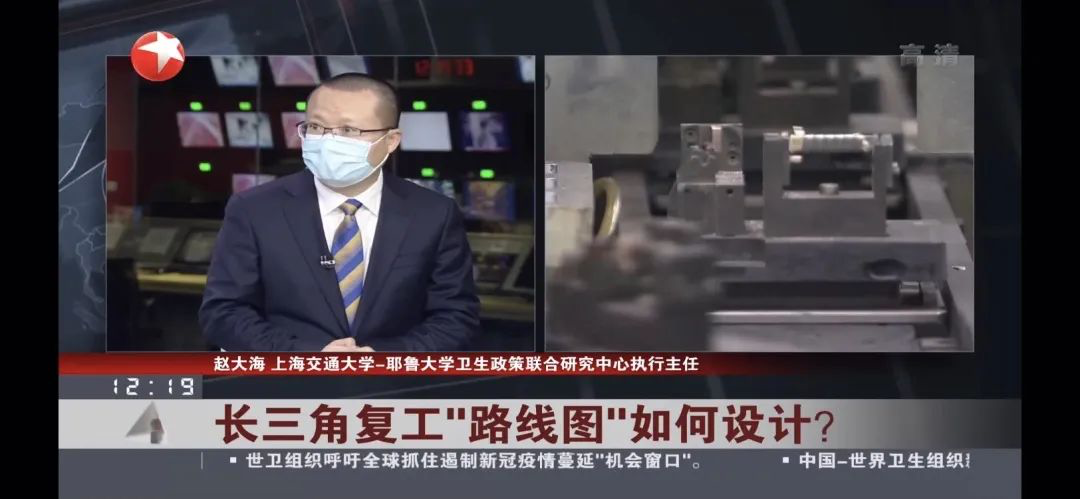上海交大赵大海做客东方卫视演播厅:疫苗研制、疫情期间大数据应用与物资流通恢复

上海交通大学国际与公共事务学院博士生导师、上海交通大学-耶鲁大学卫生政策联合研究中心执行主任赵大海近日做客东方卫视演播厅。在2020年2月23日中午12点的《中国长三角》节目,赵大海就有关新冠肺炎疫苗研发、大数据在疫情防控当中的应用、精准复工和长三角物资流通恢复等进行了直播访谈。同期演播室访谈嘉宾是上海市公共卫生临床中心主任卢洪洲教授。现将有关赵大海的访谈摘录如下。

主持人:我们知道,疫苗现在各方面的科研工作者动作是非常快,但是它还有一个周期,根据您了解到的国际上的情况,通常的这个疫苗的研发,它是一个怎样的过程?
赵大海:对于疫苗的研发而言,一般我们认为会比药品在安全性方面的要求更高。因此,我们从公共卫生政策的角度来看,疫苗即便是上了临床试验之后,也一般需要半年左右的时间才能真正在疫苗的安全性、有效性等方面有一个比较可靠的评估,因此,我预期的这个时间可能要到年底才能做到。乐观估计的话,今年年底才能真正批量生产出疫苗。
主持人:对,所以其实它每一个阶段都需要花时间,我们还需要等待,但是这个等待我们是有方向的,是有未来的。

主持人:其实对于长三角来说,信息的流动是非常重要的一个环节。那在疫情大考面前,信息流动恐怕就更加重要了,所以想问一下您,在您看来,就是在这样的疫情当中,大数据它可以起到一个什么样的作用?
赵大海:通过目前对于疫情的防控来看,大数据已经起到了非常重要的作用。主要的是对于确诊患者在流行病学调查密切接触者的时候,用到了大数据的方式,可以快速地来锁定确诊患者的密切接触者,对密切接触者进行集中隔离等。
主持人:嗯,对,您刚举的例子也很到位,很多人都很好奇,说为什么我们的流调队可以那么快就找到这些密切接触者,就跟大数据的运用有关系。

主持人:那如果说没有疫情的发生的话,这两个月长三角本来应该是重大项目密集推动,重大改革措施不断落地的时候,但现在呢,尽管恢复被疫情打乱的节奏还在进行,不仅关乎这一年的目标任务,其实更是关乎到长三角未来的影响力和竞争力。分级分类,精准防控,是有序复工的前提,在您看来,不同类型的企业,其防控的重点应该有怎样的不同?对于即将开始的全面复工,您的观点是什么?
赵大海:可能还要看一下企业的具体的特征。譬如说对于餐饮类的这种行业,就是它不太方便进行防护,顾客很难保证戴口罩;在这种类型的这种行业,可能复工还是要比较谨慎一些。但是对于一些其他的企业,譬如说制造业等行业,只要在加强常规监测等的措施前提下,应该讲已经初步具备了复工的条件。
主持人:是,也就是说如果这个企业是密闭型生产的,我们的防控相对还比较好做,流动性强的,我们可能要更加谨慎,一步一步的来。那另外呢,事实上我们也很关心,目前生产物资的流动也是复工复产很重要的一环,站在长三角的角度,您怎么来观察,就是在我们这个长三角一体化的框架之下,我们的物资流动怎么样还可以再激发它一下,来保障尽快的恢复经济生产。
赵大海:对于生产物资的流通而言,即便是在疫情最严峻的时候,依然有一定量的物资的流动,譬如说从宁夏到湖北到武汉的急用物资的运输,因此,我们可以借鉴当时的这个做法,就说长三角各省市建立一个运输人员以及运输车辆的报备制度,譬如说今天上午在上海,已经进行过驾驶员健康检查了,可能今天下午到另外一个省的时候就不需要再做进一步的检查了,这样可以加快整个物资生产的流通。
主持人:对,就像刚才我们说的互联互通,这个互相的认证尽快地推开,可以加快速度。
供稿单位:国际与公共事务学院
日期:2020年02月24日
Dahai Zhao, Executive Director of SJTU-Yale Joint Center for Health Policy was Interviewed by Dongfang TV: Vaccine Development, Big Data Application and Material Circulation Recovery during the Epidemic
On the program "China: Yangtze River Delta" at 12 o 'clock on February 23, 2020, Dahai Zhao conducted a live interview on the research and development of COVID-19 vaccine, the application of big data in epidemic prevention and control, the precise resumption of construction and the recovery of material circulation in Yangtze River Delta. The guest speaker in the studio was professor Hongzhou Lu, director of Shanghai Public Health and Clinic Center. The interview about Dahai Zhao is excerpted below.
Anchor: As we know, the scientific researchers in all aspects of the vaccine are moving very fast, but it still has a cycle. According to what you know about the international situation, what is the usual process of research and development of this vaccine?
Zhao: For the development of vaccines, we generally think that safety requirements are higher than other drugs. Therefore, from the perspective of public health policy, even after the vaccine has been in clinical trials, it generally takes about six months to have a more reliable assessment of its safety and effectiveness. Therefore, the time I expect may not be achieved until the end of the year. With optimistic estimates, the vaccine won't be ready for mass production until the end of the year.
Anchor: Yeah, so it takes time at every stage, we have to wait, but this waiting has a direction and a future.
Anchor: In fact, for the Yangtze River Delta, information spreading is very important. Facing the epidemic, it may be even more important. So in your opinion, what kind of role can big data play in such an epidemic?
Zhao: According to the current prevention and control of the epidemic, big data has played a very important role. The main thing is that when epidemiological investigation is conducted on the close contacts of the diagnosed patients, big data can be used to quickly identify the close contacts of the diagnosed patients and conduct centralized isolation of the close contacts.
Anchor: Well, yeah, many people are curious about why our team can find these close contacts so quickly, it has something to do with the application of big data.
Anchor: If there was no epidemic, major projects were supposed to be intensively promoted, and major reform measures were supposed to be continuously implemented in the two months. But now, the recovery was disrupted, the epidemic was still going on. It is not just about goals and tasks of this year, is actually about the influence and competitiveness of the future of Yangtze River Delta. Hierarchical classification and precise prevention and control are the prerequisites for orderly resumption. In your opinion, how should different types of enterprises focus on prevention and control? What is your view on the upcoming full-scale resumption of work?
Zhao: Depend on the specific characteristics of the enterprise. For example, for the catering industry, it is not convenient for protection, and it is difficult for customers to ensure that they wear masks. In this type of business, it may be more prudent to resume work. However, for some other enterprises, such as manufacturing and other industries, as long as measures such as strengthening routine monitoring are strengthened, it should be said that the conditions for resumption of work have been initially met.
Anchor: Yes, that is to say, if this enterprise is in a closed production, our prevention and control is relatively easy to do. When the liquidity is strong, we may have to be more cautious, step by step. In addition, we are also very concerned about materials circulation. This is an important part of production resumption. What can we do to stimulate materials circulation to ensure the restoration of economic production for Yangtze River Delta integration as soon as possible.
Zhao: Regarding the circulation of production materials, even during the worst of the epidemic, there is still a certain amount of material flows, such as the transportation of urgent supplies from Ningxia to Hubei and Wuhan. Therefore, we can learn from this practice at that time to establish a reporting system for transport personnel and transport vehicles between provinces and cities in the Yangtze River Delta. For example, in Shanghai this morning, the driver health examination were carried out. Probably no further check is required when he drive to another province in this afternoon, which can speed up the circulation of the entire material production.
Anchor: Yes, just like what we said, this mutual authentication can be pushed out as quickly as possible to speed things up.
Contributor: SJTU School of International and Public Affairs
Data: February 24, 2020

